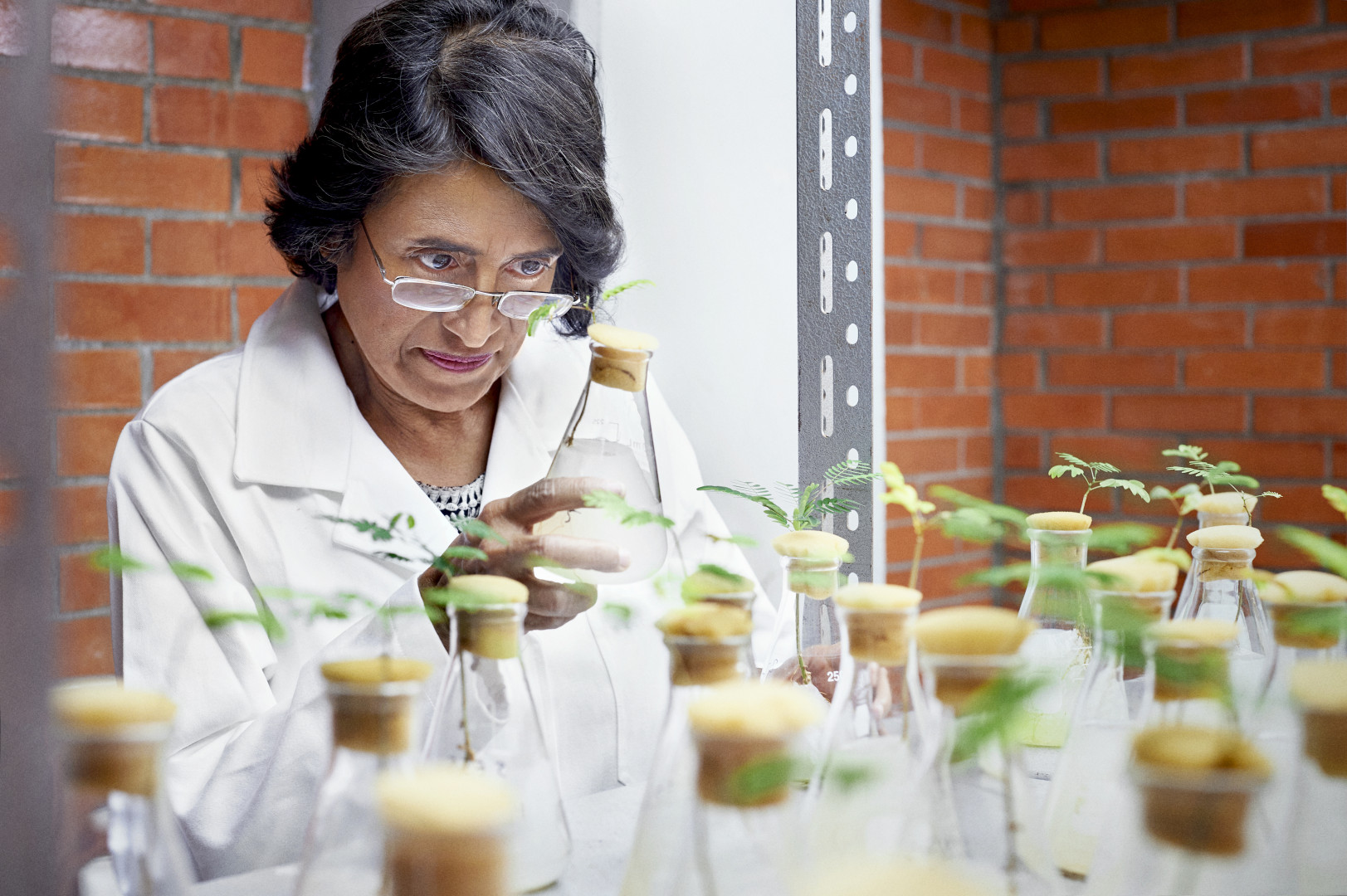PR ESPERANZA MARTINEZ-ROMERO - 2020 Laureate for Latin America and the Caribbean
Professor of Environmental Science at the Genomic Science Center, National University of Mexico, Mexico
Empowering smallholder farmers to raise productivity by adopting sustainable practices sits at the heart of feeding the world’s rapidly growing population. Professor Esperanza Martínez-Romero is addressing this challenge by harnessing the power of beneficial bacteria to promote plant health. Her significant discoveries in understanding the role of local nitrogen- fixing bacteria in increasing crop yields, particularly in cereal and legume crops, stand to support global food security and improve smallholders’ livelihoods. They could even lead to a reduction in the use of synthetic fertilisers, helping to protect the environment and safeguard biodiversity.
“We all live in symbiosis with microbes, but they have typically been neglected in all ecosystems,” explains Prof. Martínez-Romero. “It’s only recently that the impact of microbiome research has changed.”
Nitrogen is essential for healthy plant growth and abundant in the atmosphere, however, in order for plants to ‘digest’ it efficiently, this life-giving element needs to be transformed by nitrogen-fixing bacteria. The resulting partnership, or symbiosis, between plants and bacteria enables the plant to maximise the benefits of the nitrogen. With its wealth of plant diversity, Prof. Martínez-Romero’s home country of Mexico has provided ample material for her studies. She has focused in particular on two of the country’s most important crops: beans and maize, exploring the interaction between plants and bacteria at a molecular level. For example, she has shone a light on the symbiotic relationship between the bacteria Rhizobia and host legume plants, such as beans, whereby bacteria gain nourishment from the plants’ roots, while delivering nitrogen via the root nodules. Prof. Martínez-Romero is intrigued by understanding the bacteria’s genome expression, in order to gain a complete view of their genome. She also researches the evolutionary implications of the process of ‘lateral transfer’, whereby bacteria exchange genes.
In 1991, she discovered that the strain Rizobium tropici could deliver high levels of nitrogen to legumes, the most widely consumed plants globally, even under stress due to soil acidity, metal content, or high temperatures. Thanks to her research, Rizobium tropici has become the inoculant of choice among farmers in many countries. Indeed, during her distinguished career, Prof. Martínez-Romero has made significant efforts to help smallholder farmers adopt biofertilisers, including by publishing a practical manual and giving multiple lectures.
Prof. Martinez-Romero’s was inspired to become a scientist by her parents. Her mother, a director at an elementary school in Mexico City, propelled her daughter towards her studies, while her father shared his zoology books with her from an early age, instilling in her a love of nature. She determined to dedicate her academic studies to biomedical research and began her current journey at the National University of Mexico’s Nitrogen Fixation Research Institute, becoming fascinated by the beneficial effects of bacteria on plants.
Her ‘Eureka’ moment came when she realised the parallels of human gut microbiota and root microbiota. "I realised that human and plant evolution has been driven by pathogens, that roots are a valuable food source for their associated microbes, and bacterial phenotypes are not good taxonomical markers,” she recalls. “I was able to look beyond nitrogen fixation as an ecological service and consider how probiotic bacteria could be harnessed to promote plant and insect development.”
Prof. Martínez-Romero describes her scientific dream as “finally obtaining bacteria that are successful in promoting plant growth and controlling insect or fungal pests in agricultural fields”, noting the difficulties in successfully transferring laboratory experiments to the field. She has also extended her research interests to understanding the symbiotic relationships between certain bacteria and native Mexican insects such as the carmine cochineal, whereby the bacteria both fix nitrogen and enable their hosts to produce more vitamins and essential amino acids. Beyond this, “I would love to see animals such as fish, fixing nitrogen,” she says. “This would be a more cost-effective way to produce fish with higher levels of protein, beneficial for human health.”
Many collaborations have enriched her work, including her first collaboration with Leuven University in Belgium, which won her substantial funding and sparked a longstanding student exchange programme. She is currently working with researchers at the Universidad Agraria la Molina in Peru to help address rural poverty and raise yields in both countries through a collective journey to advance knowledge on mutually beneficial relationships between bacteria and host plants.
While gender prejudice in the workplace has not held Prof. Martínez-Romero back, she recognises the challenge of male-dominated conferences, decision-making groups and awards committees. “Women in science are highly dedicated, intuitive and very bright,” she says. “Whenever I am part of a steering committee for congresses, we always seek to create a gender balance among the speakers.”
She is keen to encourage more young women to build a career in science, highlighting that “in the laboratory, there is no difference between women and men scientists whatsoever”. In particular, she coordinated a university’s undergraduate programme in Genomic Sciences for six years, supporting both her female and male students, and is proud of the outstanding successes of her women graduates, both in Mexico and internationally.
“The L’Oréal-UNESCO For Women in Science Awards renew my enthusiasm for research and I very much hope it will encourage more girls to enter science,” she concludes. “Gender discrimination should no longer play a part in determining who progresses in scientific research. Science is wonderful and should be open to everyone.”
Source: L'Oréal-UNESCO For Women in Science Intrnational Awards - 2020 Press kit

Image gallery1
Comments0
Please log in to see or add a comment
Suggested Articles



